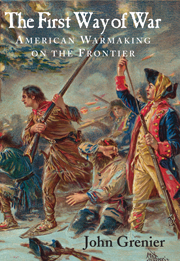Book contents
- Frontmatter
- Contents
- List of Figures and Maps
- Preface
- Acknowledgments
- List of Abbreviations
- Introduction
- 1 The First Way of War's Origins in Colonial America
- 2 The First Way of War in the North American Wars of King George II, 1739–1755
- 3 Continental and British Petite Guerre, circa 1750
- 4 The First Way of War in the Seven Years' War, 1754–1763
- 5 The First Way of War in the Era of the American Revolution
- 6 The First Way of War in the 1790s
- 7 The First Way of War and the Final Conquest of the Transappalachian West
- Epilogue
- Index
1 - The First Way of War's Origins in Colonial America
Published online by Cambridge University Press: 05 June 2012
- Frontmatter
- Contents
- List of Figures and Maps
- Preface
- Acknowledgments
- List of Abbreviations
- Introduction
- 1 The First Way of War's Origins in Colonial America
- 2 The First Way of War in the North American Wars of King George II, 1739–1755
- 3 Continental and British Petite Guerre, circa 1750
- 4 The First Way of War in the Seven Years' War, 1754–1763
- 5 The First Way of War in the Era of the American Revolution
- 6 The First Way of War in the 1790s
- 7 The First Way of War and the Final Conquest of the Transappalachian West
- Epilogue
- Index
Summary
In July 1779 Thomas Jefferson wrote to William Phillips explaining the treatment of Lieutenant Governor Henry Hamilton, a British officer held prisoner of war by the state of Virginia. In an earlier letter Phillips, who had been Hamilton's superior at Detroit, protested Jefferson's insistence that Hamilton remain in “strict confinement.” Tradition as well as several written agreements on the treatment of prisoners of war dictated that captors had the responsibility to either exchange officer prisoners quickly or parole them. However, when his captors brought him from Illinois to Williamsburg, Jefferson authorized them to shackle Hamilton in irons and lock him in a prison cell. Phillips, upon receiving word of this seeming ill treatment, requested that Jefferson “put a claim for this British Officer Lieutenant Governor Hamilton being set at liberty and considered a prisoner of war.”
Jefferson refused to intervene on Hamilton's behalf. Instead, he sent Phillips an impassioned argument against granting Hamilton parole or exchange. “Governor Hamilton's conduct,” Jefferson wrote, “has been such as to call for exemplary punishment on him personally.” He reminded Phillips that the “general nature of the service he [Hamilton] undertook at Detroit and the extensive exercise of the cruelties, which that involved” justified his refusal to either parole Hamilton or exchange him for an American officer held in Phillips's custody.
What in Hamilton's conduct at Detroit was so reprehensible as to make Jefferson forbid him the privileges normally accorded officer prisoners of war?
- Type
- Chapter
- Information
- The First Way of WarAmerican War Making on the Frontier, 1607–1814, pp. 16 - 52Publisher: Cambridge University PressPrint publication year: 2005



